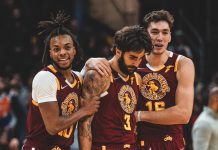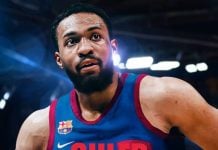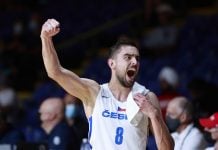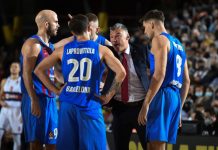In the third and final part of his interview with TalkBasket.net, Rony Seikaly explores the last chapter of his basketball career: his return to Europe in order to bolster FC Barcelona’s roster in the 2000-2001 campaign.
The diametrically different views on how the Lebanese/American center should be used by his coach, legendary Aito Garcia Reneses, caused intense and eventually irreparable friction between them that resulted in Seikaly leaving the team in November. That was the last the basketball world would ever see of him. Three Spanish ACB and four Euroleague games was all he got to play, including a win over London Towers that paved his way to the exit. Although he averaged 17.3 points and 6.3 rebounds in his first three international games with Barca, the fourth turned out to be a disaster: 12 minutes, 4 turnovers, 0 points led Rony to the bench – from which he was never to return- at the 22nd minute.
It was evident that from that point on, the 35-year-old had no intention of staying with the Spanish side. The club asked him to apologize, after failing to show up at one practice session and an ACB game. This was the end of a 12-year-long pro career for Seikaly, who would later go on to become a businessman and a world renowned DJ-producer. Recounting his days with Reneses in Barcelona, the retired player holds no punches with regards to being subjected to the demands of an “inflexible and stubborn coach”, who “was absolutely horrible for the way I played” and “treated his players like kids”.
Is that all? Of course not. Throughout his time in the NBA -and prior to it- the 6’10” center had been linked to various teams from Greece that were reportedly interested in him. Contrary to the popular belief, Seikaly reveals that the only official offer he ever received from a Greek club was AEK Athens in 1988, a few days before his NBA dream would come true. Panathinaikos BC had always been in touch with him, but the fact that Rony was on NBA contracts and the “Greens” used to rely mostly on bigs with European experience (Vrankovic, Radja, Rebraca) rendered the idea of signing him almost infeasible.
And if this particular goal he did manage to fulfill, the same cannot be said about his aim to wear the blue-and-white jersey of the Greek National Team. Rony had been practising for three years (1983-86) with Greece, but there were some insuperable bureaucratic procedures that sank the whole project of him obtaining the citizenship and being able to play with the team that won gold at the 1987 Athens Eurobasket. Apart from becoming FIBA World Champion as a Syracuse student in 1986 with the USA squad (featuring future NBA stars Charles and Kenny Smith, David Robinson, Sean Elliott, Muggsy Bogues and Steve Kerr), Seikaly also played for the Lebanese NT at the WABA Championship in 1999 with rather impressive results.
If the first part was about Lebanon and music and the second touched on current topics in the NBA, such as the GOAT debate and Luka Doncic, the third is all about the international basketball career that Rony enjoyed – to a greater or lesser extent.
In this respect, his view on Pau Gasol and especially Nikos Galis, is particularly relevant. Galis, a Naismith HOF member, is widely regarded as one of the best international players of all time who did not play in the NBA. He was the No.68 pick in the 1979, but the Boston Celtics never signed him, a fact that the legendary Red Auerbach reportedly called “the single biggest mistake in my career”. Galis and Seikaly never played together in an official game, but Rony found then-youngsters Pau Gasol and Juan Carlos Navarro (both 20) in Barcelona, plus an ever-ascending Sarunas Jasikevicius who recently came back as the team’s head coach.
Without further ado, we present you Rony Seikaly Part III.
Q: In an interview with a Spanish newspaper in 2000, you said: “If I were to compare the NBA to the Spanish League, I would drive myself crazy. They are two completely different worlds”. Do you have the same opinion now?
A: Yes, they are completely different because in the NBA players are treated as professionals. In the Euroleague, they’re treated as college players. They have to share the same room and always be together. There is no private jets. You just go back to the airport terminal like everybody else. It’s a different world. In the NBA, you’re responsible for your actions when you’re on the court, but outside of it you can do whatever the hell you want. Dennis Rodman would never be able to play in Europe because everything is so structured. When I went to Barcelona in 2000, being told that the team is practising twice a day was something I didn’t expect. In the NBA, you practise once a day, except if you’re at training camp.
Q: Did you get the impression that coaches in Europe are bigger than athletes?
A: I believe that they have more power than coaches in the US. They have a certain system in a certain way, regardless of what talent there is on their team. In the NBA, if you’ve got players that do things better than others, they will change the way offense is being set up or the way you get the ball. They will try to increase your effectiveness. In Europe, you’re just a number that has to fill the role in the system. That was the case when I played.
I had a coach in Barcelona who was absolutely horrible for the way I played. First of all, he treated players like kids. My strength was always to be under the basket and he wanted me to be by the three-point line. I had absolutely nothing to do over there because I’m not a three-point shooter, but an inside player. I went to Barcelona because I thought that the coach would use me properly, knowing that I had a broken foot – in the sense that he would get me into a position where I could help the team.
Those things happen if you are inflexible as a coach and very stubborn. Aito had a rotation, where every player got pulled out after 5-6 minutes, regardless of whether he was on fire. Sometimes, you need a couple of minutes to get going. If you get pulled out too early, you start losing your confidence because you’re not given the chance to redeem yourself. To me, he was super rigid and his system could work only with European players who understood it. For somebody who comes from the NBA, it seems like going back to the days of being a kid. It doesn’t really work. I would score three baskets in the first four minutes and then I would sit on the bench wondering why I got pulled out.
Q: Did you get any advice or info before signing with Barcelona?
A: The doctor told me that I couldn’t play basketball anymore. To him, a had a career-ending injury. I trained and kept working my ass off because I wanted to prove him wrong and come back. But the pain was so bad after games and practices that I figured that the only way was to go to a team in Europe. I wanted to go to a good one, so that I could be a piece to the puzzle and not have all the pressure on me; because I wasn’t going to be able to deliver. Two-three years before my injury, I could have gone to any club in Europe and take on the responsibility of carrying it through European Championships. When you’re going to a big team, you know that you’re going to play with other good players. In smaller teams, you have to do everything yourself because you are the superstar.
In Barcelona, I was never put in a position to succeed. I was really playing in pain and I thought: “If I can’t help this team, there is absolutely no reason for me to stay there”. It wasn’t worth the pain. I would wake up at night to go to the bathroom and I had to hold on to the wall because I couldn’t stand on my feet.
Even though I would have loved to play in Greece to finish off my career, I didn’t talk to any teams from there. I thought that this injury was so bad that I wasn’t going to be able to play. So, I figured I should try in Barcelona first and if things worked out, I could go to a Greek team or wherever. It was like a test for me.
Then, I saw Aito run Barcelona like a college team. I was playing next to Pau Gasol and other great players. I really loved playing with Pau. I could just tell that his basketball I.Q. is very high. He had great hands, he could shoot the ball and whenever we played together I knew what he could do. He knows Aito and his system. For me, going to Barcelona after the NBA is like Pau Gasol leaving the league now and go play with an Aito-kind-of-guy.
Q: What was the story of Greek teams trying to sign you? Several reports had you negotiating with PAOK (in 1985 and 2000). In 1988 -before joining the Heat- you received a lucrative offer from AEK Athens and ten years later (1998) you were at Panathinaikos’s pre-season camp, where you reportedly expressed your wish to play for them the following season (1999-2000).

A: All those stories are myths. Obviously, I always had an open door to come back to Panathinaikos. It was my dream to play for them. During the summer, when I returned to Greece, I would practise with Olympiacos, PAOK, Panathinaikos, just to stay in shape.
As far as contractual stuff goes, the only offer I got was from AEK’s owner, Makis Psomiadis, in 1988. I got drafted by the Heat, I went back to be with my family in Athens and Psomiadis came to my house for a visit to tell me not to play in the NBA and go to AEK instead. I said to him: “Thank you for the opportunity, but I’m looking forward to playing in the NBA”.
From there on, a lot of teams told me: “You should come play with us”, but it was never formal. I had only verbal offers, like an invitation to play for PAOK or Panathinaikos. We never got to the details of a contract. It was my personal goal to come back and play in Greece because that’s where I started playing basketball. But my experience in Barcelona and the pain in my foot were so bad that I didn’t want to end up as the player who just comes and collects the paycheck.
Q: Just to get the record straight, when did you move to Greece from Lebanon?
A: It was in 1976 or 1977. My family moved to Greece first and then I went to boarding school.
Q: Did it feel somewhat ironic that you won a gold medal with Team USA in 1986, although you had been training with Greece?
A: I tried to play with Greece, but I couldn’t get the passport. I trained with the NT for many years and I really thought that at some point I’d play with them. But they never got me my citizenship. Otherwise, I would have played with Greece and probably I’d still be with them (laughs)!
Q: In the documentary about you released last year, you quoted your agent saying that if the Hornets had picked you instead of the Heat, you would have gone back to Greece to play. Would you?
A: Yes, that’s true. I would have played for Panathinaikos.
Q: How did you manage to play with both the US and the Lebanese NT?
A: I have a Lebanese passport and although I always thought that you’re not allowed to play for two National Teams, they (the Lebanese) said they asked FIBA for permission. Imagine that I played for Lebanon with a broken foot (in 1999).

Q: We all know you’re a die-hard Miami Heat fan. How about Europe?
A: I love good teams and watching good games whenever they come along. I don’t watch too much because it’s not interesting to see everyone play all positions. I liked when players had roles. The point guards- like John Stockton, Steve Nash and those guys- were supposed to set up the team. The power forward is the one who gets the rebounds, sets the picks and finishes – like Karl Malone did. The small forward was the guy that slashed. It was more of a structured game, where you could follow players and know their strenghts and weaknesses based on their position. Today, although they are more athletic, skilled and can play multiple positions, it would be more fun if they had a defined role.
Q: Did you actually say that Nikos Galis wouldn’t have succeeded in the NBA because he was one-dimensional?
A: Never. I think Nikos Galis is one of the best talents to have come out of Greece. Obviously not on the level of Giannis, but for Europe he was a scoring machine and a super talented basketball player. I just don’t think his size would allow him to have been an NBA player at that time. He was smaller than everybody else and you also had to play defense. In the NBA, if you play for the right team, you have the chance to become a good player. If he had gone to the Celtics back then, he wasn’t going to be a good fit.
It’s like me going to Barcelona. Had I gone to another team in Spain, maybe I would have played 4-5 years there or anywhere in Europe because the system works for the way I play basketball. If Galis had gone to a team who was after a scoring point guard, he could have played in the NBA. Nikos was such a great player in Greece, the king of basketball. For him to come to the NBA and be a secondary player, I’m not sure that’s what he wanted anyway. Even if he made a team and averaged 12 points a game, he wasn’t going to be the king, like he was in Greece.
Q: How did you experience the 1987 Eurobasket final, sitting next to the Greek bench?
A: The year before I had played with the USA and won the gold medal. When Greece went to the finals, I flew to Athens to give them my support. I was dreaming that I was on the team. It’s one of the dreams that I had and I wasn’t able to get. My loyalty basketball-wise goes to Greece because had I been anywhere else, I’m not sure I would have had the opportunity to play the game at all. I owe that to Greek basketball because they were the ones that basically brought me up and put me in a position to succeed. My basketball nationality is Greek.
















